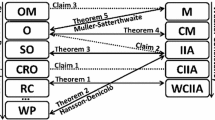Abstract
I develop sufficient conditions for transitivity and acyclicity of social preferences, continuing the investigation of restricted domains begun by Black (J Polit Econ 56:23–34, 1948; The theory of committees and elections. Cambridge University Press, Cambridge, 1958), Arrow (Social choice and individual values. Wiley, New York, 1951), and Sen (Econometrica 34:491–499, 1966; Rev Econ Stud 36:381–393, 1969). The approach, which excludes certain triples of rankings over triples of alternatives, contributes to the literature in three ways. First, I generalize majority rule to classes of social preference relations defined by their decisiveness properties. Second, I consider not only transitivity of weak and strict social preference, but I provide conditions for acyclic strict preference as well. Third, the well-known conditions of value restriction, single peakedness, and order restriction are shown to satisfy corresponding exclusion conditions, so transitivity results on these domains follow from the more general analysis; in particular, the results are applied to weakly single-peaked preference profiles, and a result on acyclicity due to Austen-Smith and Banks (Positive political theory I. University of Michigan Press, Ann Arbor, 1999) is obtained as a special case. In contrast to the latter authors, the approach fixes a single preference profile and does not rely on the properties of social preferences as individual preferences are varied.
Similar content being viewed by others
Notes
See also Gans and Smart (1996) for analysis of a single-crossing condition that is equivalent to order restriction.
For example, it precludes Pareto social preferences, defined subsequently. It is customary to define Pareto indifference by xIy if and only if \(I(x,y)=N\), and this relation is actually transitive. But when non-comparable pairs are added to this relation, it may become intransitive.
See the \(\alpha \)-rules of Ferejohn and Grether (1974) or counting rules of Austen-Smith and Banks (1999). Note that simple rules and voting rules satisfy Arrow’s independence of irrelevant alternatives, and aggregation rules that violate IIA (such as Borda) will not in general generate simple or relatively simple social preferences.
Depending on terminology, one might think of this as the inverse of rank; it is roughly the number of alternatives below x in i’s ordering, plus one.
The definition of single-peakedness in the spatial model sometimes also requires existence of an ideal point, which maximizes \(u_{i}\). When preferences are single-peaked and X is convex, an ideal point must be unique, but in general the definition used here allows for two ideal points. For example, if \(X=\{a,b,c\}\) and \(aI_{i}bP_{i}c\) for each individual, then \(\pi \) is single-peaked.
For such a linear ordering \(\prec \), because d and b are worst for individuals 1 and 2, respectively, these alternatives must be at the extremes of \(\prec \). Then up to reversals, the linear ordering must be \(b \prec a \prec c \prec d\) or \(d \prec a \prec c \prec b\). The first case is precluded by individual 2, and the second is precluded by individual 1.
Note that individual 1 prefers a to c, but the others have the opposite preference; individual 2 prefers d to b, but the others do not; and individual 3 prefers c to b, but the others do not. Thus, no individual can be middle ranked in a fixed ordering of individuals.
Rothstein’s (1990) proof is incomplete, however. He states that if value-restriction is violated, then there exist three alternatives and three individuals in a specific relationship, but he does not prove the assertion.
References
Arrow K (1951) Social choice and individual values. Wiley, New York
Austen-Smith D, Banks J (1999) Positive political theory I. University of Michigan Press, Ann Arbor
Black D (1948) On the rationale of group decision-making. J Polit Econ 56:23–34
Black D (1958) The theory of committees and elections. Cambridge University Press, Cambridge
Duggan J (2013) Value restriction, median voters, and the core (unpublished paper). www.johnduggan.net
Ferejohn J, Grether D (1974) On a class of rational social decision procedures. J Econ Theory 8:471–482
Gans J, Smart M (1996) Majority voting with single-crossing preferences. J Public Econ 59:219–237
Inada K (1964) A note on the simple majority decision rule. Econometrica 32:525–531
Inada K (1969) The simple majority decision rule. Econometrica 37:490–506
Rothstein P (1990) Order restricted preferences and majority rule. Soc Choice Welf 7:331–342
Rothstein P (1991) Representative voter theorems. Public Choice 72:193–212
Schwartz T (1986) The logic of collective choice. Columbia University Press, New York
Sen A (1966) A possibility theorem on majority decisions. Econometrica 34:491–499
Sen A (1969) Quasi-transitivity, rational choice, and collective decisions. Rev Econ Stud 36:381–393
Sen A, Pattanaik P (1969) Necessary and sufficient conditions for rational choice under majority decision. J Econ Theory 1:178–202
Author information
Authors and Affiliations
Corresponding author
Additional information
I thank the editor and anonymous referee for their helpful remarks.
Rights and permissions
About this article
Cite this article
Duggan, J. Preference exclusions for social rationality. Soc Choice Welf 46, 93–118 (2016). https://doi.org/10.1007/s00355-015-0906-3
Received:
Accepted:
Published:
Issue Date:
DOI: https://doi.org/10.1007/s00355-015-0906-3




